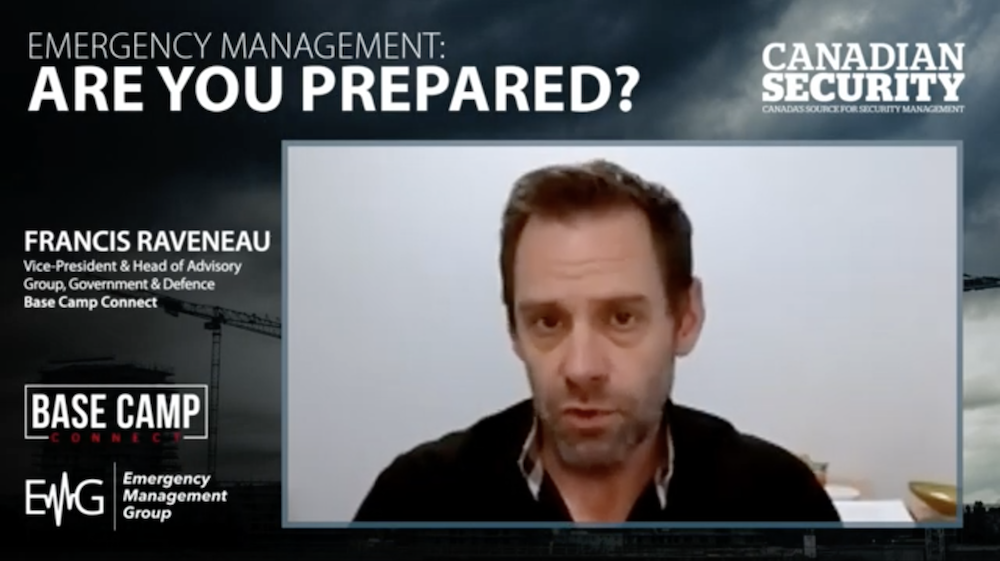
Q&A: Francis Raveneau, Vice-President & Head of Advisory Group, Government & Defence, Base Camp Connect
By Canadian Security Staff
Security Resources emroundtable
How is technology an enabler for emergency management?
The technology is an enabler in many ways, from the planning process all the way down to the operations when there’s an emergency — and even afterwards.
So, we’re thinking about planning software all the way down to recording software that will be used for after the fact, right? So, when we’re getting back together after an event and say, “Okay, how we can improve on that.”
So, there are many ways that technology is an enabler. In our opinion it might be an issue, because there are so many tools out there, that the emergency managers are not IT professionals. They might struggle to find, well, “Where should our priority number 1-2-3-4-5 be? And where are the tools?”
So that’s maybe the easier part, because it’s our job to do that, but what are the tools to help us do that?
And we think that the best way to do it there, as we do in private organizations, is information sharing. Really a collaboration on what’s been used by who, what worked well, and how it could be easily implemented. So, sharing best practices on tools, I think it’s something that needs to be to be done because the tools themselves exist — very effective, very useful.
But I think maybe a standardization needs to be done so that the different entities can share that information, and the tools that they’re using, to make sure that everybody has a standard and it saves time for everyone.
Is there technology training or standardization that can help organizations collaborate more effectively?
There are certain standards for the operations, you know, search and rescue operations, for example, there are standards there. The major search and rescue organizations are trying to implement standards on equipment at the same time, and there’s part of it that’s already done.
On the technology side, it seems to be a little bit more difficult because there are different tools that exist. And I don’t think the industry is at the point that there are standards right now. There are standards for, you know, how rugged your case is, and is it resistant to water and things like that — so those standards are there.
But standards as to which organization or which type of organization and for which type of event, we will have a standard on the equipment side, I don’t think we’re there yet.
Certainly, everybody needs to have a radio but nobody has a standard of radio sharing frequencies, for example. This is kind of done on the spot, so I think there’s another layer that needs to be done there.
And then sharing equipment, I think should be an important part. It’s not necessarily a standard, but sharing the equipment, especially when we talk about technology, sometimes it can tend to be expensive for some type of equipment.
Smaller organizations should benefit from either having a standard or having standard practices of sharing that type of equipment. And if we take the example of satellites, some of them are costly to acquire and to maintain because you need to have a data plan that comes with it.
So, if you’re a smaller organization, you don’t have the money to do it yourself, sharing that with other types of organizations that most likely will not use it at the same time during the year will help in in kind of flattening the curve of the price point, while at the same time serving your interests because now you have something that that you need, you’ve been needing for a long time, but that’s kind of hard to acquire by yourself.
So, a standard of sharing that type of information between organizations, I think, should be done so that some of those tools can be shared with all the different organizations together.
And that includes training, because that’s an important part. So, they all pull together, they all train so when they’re ready, when they need to use this type of system, they will be able to have it out in the field and know how to use it and be more effective during the emergency.
Print this page
Advertisement
- Tips on shady finances ‘may not get investigated’ amid police constraints: RCMP note
- VIDEO: Emergency Management Roundtable One-on-One: Francis Raveneau
Leave a Reply